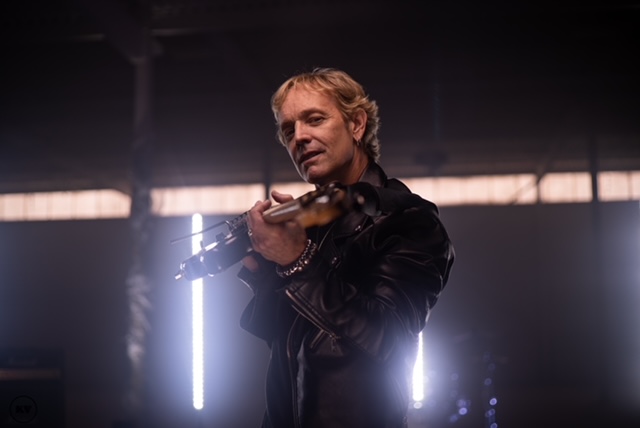At first glance it might appear to be a bit of an oddity that an established classic rock act like Saga would be headlining Friday’s event at Toronto’s Phoenix Club ((With opening bands Suns Of Stone and the David Barrett Trio) Yet follow through their itinerary and you will notice that Saga’s future dates at Average Joe’s nightclub in Lethbridge Alberta Feb.14th and Calgary’s Deerfoot Casino the following day only serve as warm-ups for a solid two-month trip to Germany and Scandinavia, a region of Europe the band is still widely popular even after 38 years of near constant touring.
“Yes, you can consider those Canadian dates as a bit of a warm-up for our European tour, ” noted guitarist Ian Crichton over the phone from his Brantford Ontario residence. “The Phoenix gig is a great way to re-connect with our Toronto fans.”
With a band that is virtually intact from their heady hit days of the early 1980’s, their lineup boasts both Ian (guitar) and Jim Crichton (bass guitar), Jim Gilmour (keyboards) and lead vocalist Michael Sadler, back in the fold with the only change being new drummer Mike Thorne who has replaced a number of Saga stickmen since original percussionist Steve Negus left following the completion of their 2003 “Marathon” release.
Surprising also is that Saga have compiled a total of 21 studio records, seven live albums, eight compilation releases and six DVD’s over that 38-year period, their latest release being `Sagacity’ which was released in July 2014 and has sold respectably to their loyal fan base both in Canada and Europe (charting at #17 in the German album charts).
“Yes it’s crazy that we’ve released all those records but that’s what we do,” acknowledged Crichton. “Bands like Styx have told us we’re nuts to record new material, financially it’s not worth it, but that’s what we do. That’s the glue that holds this band together, if we didn’t record, I don’t think we’d still be together.”
Their debut, self-titled indie release on Maze Records in 1978 sold modestly domestically but chalked up 30,000 unit sales in Germany where it was available as an import. Produced by Paul Gross at his Scarborough Phase One studios, he worked on two further Saga releases; `Images of Twilight’ in 1979 (which featured “It’s Time” and “See Them Smile”), and their 1980 “Silent Knight” record (which achieved airplay for “Don’t Be Late” and “Careful Where You Step”.
Saga then moved to London England to record their 1981 “Worlds Apart” album, with ace producer Rupert Hine, a record that proved to be their best-selling release with “Wind Him Up” scoring as a huge hit single. The success of that record also won them a Juno for Most Promising Group at the 1982 awards ceremony.
Saga’s prog-rock stylings hit the airwaves at a time when the likes of Supertramp, Genesis, Yes and Pink Floyd were all hugely popular and the band’s combination of synthesizers, instrumental guitar arrangements topped by Michael Sadler’s distinctive vocals made Saga a hot item with classic rock radio stations like Toronto’s Q-107. A tour opening for Styx helped break the band in Great Britain and Europe and they commanded headline status at Toronto’s Maple Leaf Gardens during the peak of their early success.
“Unfortunately, our manager, Clive Corcoran, who was originally from England, didn’t think we were getting a fair cut of the concert revenues,” noted Crichton. “So he re-positioned us in Europe and I don’t think we played North America again consistently for about another 10 years. In retrospect, this really hurt us because when we tried to re-establish ourselves again we were no longer able to play the Arena circuit.”
It didn’t help that Hine’s next production effort in 1983, `Heads Or Tales’, didn’t match the sales figures of `Worlds Apart’ although “The Flyer” and “Scratching The Surface” were bonafide hits. Corcoran pushed for a stylistic change, Peter Walsh replaced Hine behind the console for Saga’s 1984 release “Behaviour” but the band’s shift in direction didn’t sit with drummer Negus and keyboardist Gilmour and they were ousted from the band.
What followed was an extended period of personnel shuffling as Sadler and the Crichtons’ toured and performed with studio musicians. Negus and Gilmour were back in the fold for Saga’s 1993 “The Secret Of Illusion” but Negus left again, this time for good after the band completed their 2003 “Marathon” record to be replaced first by Christian Simpson, then Brian Doener and finally Chris Sutherland before Mike Thorne took over in 2014.[youtube width=”600″ height=”400″ video_id=”JbAVeGymxAc”]
When Sadler decided he was leaving on January 16th 2007, Saga’s future seemed to be in jeopardy. Sadler participated in a farewell tour which culminated in the release of the `10,000 Days’ record but showing the same never say die attitude which had kept the band afloat for 30 years, Saga took to the internet to advertise for a replacement vocalist. A world-wide search culminated in the band hiring Final Frontier lead vocalist Rob Moratti.
“Rob was a great guy with a great set of pipes but he wasn’t Mike,” said Crichton reflecting the obvious. “He recorded one album with us (2009’s “Human Condition”) but it was obviously a tough challenge for him replacing an established vocalist. We toured with him once the Germany and the crowd’s weren’t bad, some venues might have been 2/3rds full but the second time through, there were a lot of empty seats. Our German fans just didn’t buy it and the promoters said, sorry guys but I think it’s over”
Fortunately for Saga, Sadler was back in the fold by early 2011 and although he was living in Los Angeles at the time ( and now lives in Missouri) he is fully committed to the cause and there is a sense of rebirth with the recording of Sagacity in 2014.
“Obviously record sales are nothing like what they were for us in the early 80’s and our fan base has downsized but our hardcore fans still buy our records and come to our concerts so we keep doing it for them,” analyzed Crichton. “Recently, we’ve had some great gigs in Germany, just like the old days, we got to perform on a cruise with Yes and we’re going to do that again in November and we keep getting offers to go back to Europe so as long as we keep getting those offers, we’ll keep playing.”
So based on the current state of the industry, how does Saga manage to stay relevant in Europe?
“Well over the years, we’ve established a great rapport with a Germany promotion company called DMC Promotions,” explained Crichton. “They do everything, flights, bookings, ticket sales, routing, we just show up and play. And so long as we keep selling out and they keep making money, everyone is happy.”
Saga is, however, leaving holes in their itinerary for Canadian dates and are planning to concentrate on re-establishing themselves domestically in the near future. “We’ve got a few festival dates planned this summer and we’d like to do 10 or 20 more dates if we can find them,” Crichton allowed. “I mean it’s great being accepted in Europe but it would mean a lot to us if we re-establish ourselves back here also.”
[youtube width=”600″ height=”400″ video_id=”eIMy69P_KMw”]













